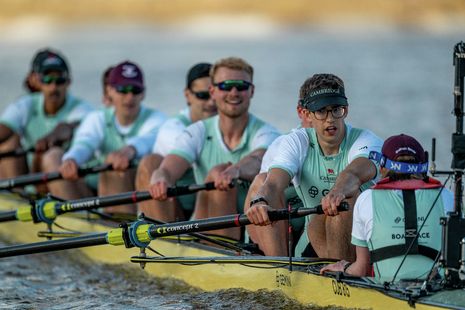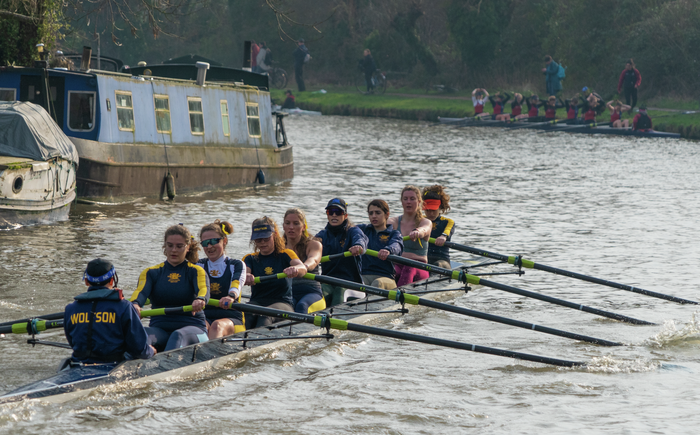Resilience on the river: Matt Edge’s triumph in the 2024 Boat Race
Jinqian Li speaks to Matt Edge about his incredible journey to victory in the 2024 Oxford and Cambridge Boat Race

In the final moments of the 2024 Boat Race, Matt Edge, Cambridge’s Blues stroke, epitomised the sheer willpower and endurance of an athlete. As Cambridge crossed the finish line, a significant lead securing their victory, Edge’s physical limits were visible, his face a stark shade of pale. Collapsing from exhaustion in the last minutes of the race, his final act before his body gave in, a now-iconic moment, was to stop his watch – a reflexive action ingrained through years of training. “It’s just muscle memory,” he says. “I got a lot of comments on my Strava about stopping my watch four seconds after the line. That’s pretty cool.”
The race, however, was fraught with challenges that tested every ounce of the crews’ strength and strategy. Early on, under Hammersmith Bridge, Edge made a critical decision to intensify his efforts. “We were suddenly presented with this opportunity to really move away from Oxford. All the time in training, we talked about how you get those moments, and you’ve got to take it. So I think I just pushed a few too many chips in myself,” he says. This surge was a gamble that ultimately paid off – but it came at a cost.
As the boats rounded the second-to-last corner, they were battered by a fierce headwind, making it difficult for Edge to maintain the rhythm necessary to keep ahead. “I was trying to set the rhythm there, but in the headwind, it became a lot harder to get up the slide. The energy that requires, while trying to set the pace, was what took it out of me,” Edge explains. Despite it, he found reassurance in the composure of cox Ed Bracey. “Ed was doing a great job of staying very calm. He never really gave the impression that he was panicking or that we couldn’t handle what was going on.”
With the race nearing its end and the cox suggesting he hand over his blade, Edge remained resolute. “Every stroke, you’ve got a choice,” he tells me. “You can collapse and slow the boat down, or you can strive for a strong stroke – all the way to the end.” “It wasn’t like I’d put the race in too much danger, but there was a lot of relief in making it over the line. I clocked that I’d survived and hadn’t completely passed out. It took me a while to appreciate that we had actually won,” he adds.
Carried out of the boat after the race, Edge was rushed to the medical tent and hooked up to an ECG. “I tried to sit up pretty quick and tell them that I was fine, because I wanted to go on the podium at the end and spray the English sparkling wine that we got,” he recalls. “My other thought was that my friends and family, particularly my partner, had seen me collapsing. I needed to make sure I got back on the telly and showed everyone that I was upright." Edge made the presentation “just after the BBC cameras cut away […] but I’m still glad to join them up there and take some photos, which was really nice.”
At the celebration dinner, Edge received a standing ovation. “It was quite strange, really. Whenever I tried to walk across the room, someone would stand up, shake my hand, and say well done. I’m really just blown away that some of these people that I looked up to for a long time as a kid, people from the 2013 race, the first one I watched, and people from the 1961 race, all came up and said well done,” he says. “It’s nice when you’re feeling like a bit of a muppet, and people who know a lot more about rowing than you do come up and say it was still a good job and to be proud of yourself.”
The media attention that followed gave Edge a big boost of followers on social media. “Lots of people were very concerned, and I received many messages, even from complete strangers, saying they hoped I was OK,” Edge tells me. “But it’s very much 15 minutes of fame. A week and a half later, it’s all cleared up now. So I can just go back to being a normal student really.” “I didn’t want it to take away from the other guys who had achieved this fantastic thing and not mistimed the pushes and collapsed on the finish. They actually got me over the line,” he adds.
Edge’s rowing journey began when he watched the Boat Race in 2013. Despite Cambridge’s loss, he was inspired by the sport and joined a local rowing club with his mother’s encouragement.
At Cambridge, Edge initially struggled but persevered. His time there was marked by challenges and triumphs, with his proudest moment coming in 2022 when he led Cambridge to victory as president of the lightweights. “To finally turn it around in what I thought was going to be my last race and get Cambridge back on winning form, that was a great race,” he recalls.
Balancing his PhD and rowing commitments, Edge remains dedicated to both. The friendships and shared experiences make the challenges worthwhile. “I’ve met some of my best friends through the club,” he says. “Really going through the wringer of training all year for one race, you share the outcome, win or lose, with them. That really binds you together for life.”
Edge’s passion for rowing is unwavering: “The motivation for me is so much more in the process and the enjoyment of the ride than the destination.” When asked about the Olympics, Edge explains that the removal of lightweight rowing and his physique makes it challenging.
At the prospect of stopping rowing, Edge explains that he’d be “more than happy” to stop if he became injured. “I’d be sad to not get to do it every day with my friends, but I’ve achieved way, way more than I ever thought I would,” he reflects.
 News / Deborah Prentice overtaken as highest-paid Russell Group VC2 February 2026
News / Deborah Prentice overtaken as highest-paid Russell Group VC2 February 2026 News / Christ’s announces toned-down ‘soirée’ in place of May Ball3 February 2026
News / Christ’s announces toned-down ‘soirée’ in place of May Ball3 February 2026 Fashion / A guide to Cambridge’s second-hand scene2 February 2026
Fashion / A guide to Cambridge’s second-hand scene2 February 2026 News / Downing Bar dodges college takeover31 January 2026
News / Downing Bar dodges college takeover31 January 2026 Comment / Men at Cambridge are experiencing equality2 February 2026
Comment / Men at Cambridge are experiencing equality2 February 2026










